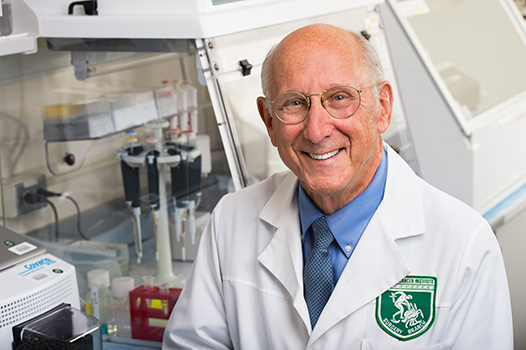Twelfth Annual Philip S. Chen, Jr., Ph.D. Distinguished Lecture on Innovation and Technology Transfer
 The Office of Intramural Research, Office of the Director, NIH, invites you to the twelfth annual Philip S. Chen, Jr., Ph.D. Distinguished Lecture on Innovation and Technology Transfer. The lecture will be held on November 17, 2017 at 10:00AM in the Masur Auditorium, Building 10, NIH campus in Bethesda, Maryland.
The Office of Intramural Research, Office of the Director, NIH, invites you to the twelfth annual Philip S. Chen, Jr., Ph.D. Distinguished Lecture on Innovation and Technology Transfer. The lecture will be held on November 17, 2017 at 10:00AM in the Masur Auditorium, Building 10, NIH campus in Bethesda, Maryland.
Steven A. Rosenberg M.D., Ph.D. will present "Cells as Anti-Cancer Drugs: Entering Mainstream Oncology". Dr. Rosenberg is Chief of the Surgery Branch at National Cancer Institute (NCI), National Institutes of Health (NIH).
Sign language interpretation can be provided. Individuals with disabilities who need reasonable accommodation to participate in this event should contact Joe Kleinman at 301-496-0472; kleinmanj@od.nih.gov or the Federal Relay 1-800-877-8339. Requests should be made at least 5 days in advance of the event.
Steven A. Rosenberg, M.D., Ph.D. is Chief of Surgery at the National Cancer Institute in Bethesda, Maryland and a Professor of Surgery at the Uniformed Services University of Health Sciences and at the George Washington University School of Medicine and Health Sciences in Washington, D.C. He is a Professor in the Department of Laboratory Medicine at the Karolinska Institutet in Stockholm, Sweden.
Dr. Rosenberg received his B.A. and M.D. degree at The Johns Hopkins University in Baltimore, Maryland and a Ph.D. in Biophysics at Harvard University. After completing his residency training in surgery in 1974 at the Peter Bent Brigham Hospital in Boston, Massachusetts, Dr. Rosenberg became the Chief of Surgery at the National Cancer Institute, a position he has held to the present time.
Dr. Rosenberg pioneered the development of immunotherapy that resulted in the first effective immunotherapies for patients with advanced cancer. His basic and clinical studies of interleukin-2 directly resulted in the approval of this immunotherapy by the US Food and Drug Administration for the treatment of patients with metastatic melanoma and renal cancer, many of whom remain disease-free over 25 years after treatment. His studies of cell transfer immunotherapy resulted in durable complete remissions in patients with metastatic melanoma and directly demonstrated the role of T lymphocytes in human cancer immunotherapy. He pioneered the development of gene therapy and was the first to successfully insert foreign genes into humans. His studies of the adoptive transfer of genetically modified lymphocytes were the first to result in the regression of metastatic cancer including patients with melanoma, sarcomas and lymphomas. In recent work Dr. Rosenberg established new approaches for the application of immunotherapy to patients with a variety of common solid cancers by targeting the unique mutations present in the patient’s cancer.
Dr. Rosenberg has been the recipient of numerous awards. He received the Meritorious Service Medal for the U.S. Public Health Service in 1981 and again in 1986, the Friedrich Sasse Prize from the University of West Berlin, Germany in 1986, the Nils Alwell Prize from Stockholm, Sweden in 1987, the Distinguished Alumnus Award from The Johns Hopkins University in 1987, The Griffuel Prize for Research from the French Association for Research on Cancer in 1988 and the Milken Family Foundation Cancer Award in 1988. Dr. Rosenberg twice received the Armand Hammer Cancer Prize “for pioneering work in cancer research” in 1985 and 1988. In 1991, he received the Karnofsky Prize, the highest honor given by the American Society of Clinical Oncology. In 1998, he was awarded the Ellis Island Medal of Honor. He received the John Wayne Award for Clinical Research from the Society of Clinical Oncology in 1996, the Flance-Karl Award, the highest honor accorded by the American Surgical Association in 2002, in 2003 he received the annual prize for scientific excellence in medicine from the American-Italian Cancer Foundation. In 2005 he received the Richard V. Smalley, MD, Memorial Award, the highest honor given by the International Society for Biological Therapy of Cancer. In 2010 he received the Karl Landsteiner Prize from the American Association of Blood Banks. In 2012 he won the Keio Medical Science Prize from Keio University in Tokyo and in 2014, the Massry Prize from the University of Southern California, Los Angeles. In 2015 he received the Medal of Honor for Basic Research from the American Cancer Society, the Lifetime Achievement Award of Distinction from the Susan B. Komen Foundation and the Samuel J. Heyman Service to America Medal as the Federal Employee of the Year from the Partnership for Public Service. In 2016 he won the Novartis Prize for Clinical Immunology.
Dr. Rosenberg is a member of the Institute of Medicine of the National Academy of Sciences. Dr. Rosenberg has published over 1100 papers in the peer-reviewed literature. A study by the Institute for Scientific Information published in 1999 reported Dr. Rosenberg to be the most highly cited person in the world in the field of oncology for the 17 years between 1981 to 1998 and the second most highly cited person in all fields of clinical medicine. Thirty-one of his papers have been cited over 500 times. His h-index of 174 continues to make him one of the highest cited clinician/scientists in the world.
